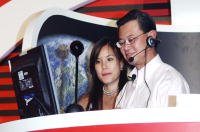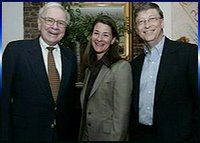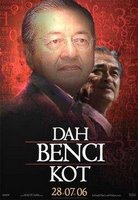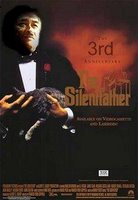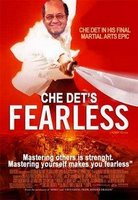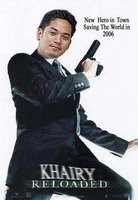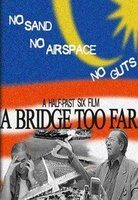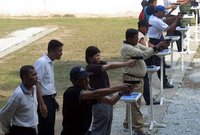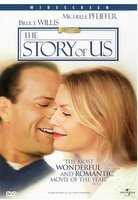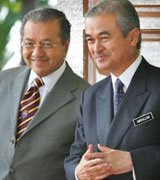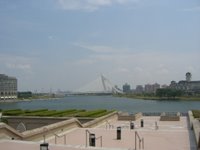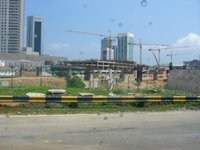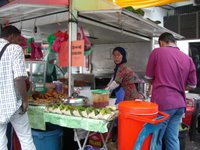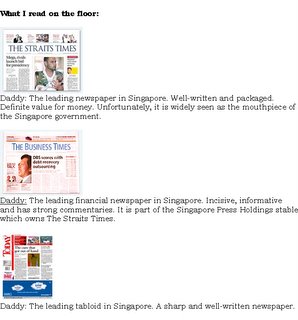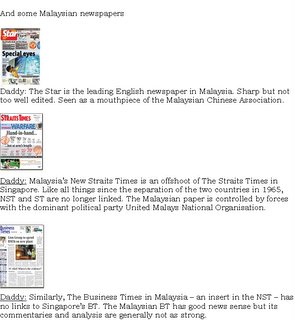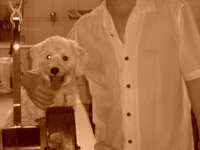Sigh, I really hate it when politics gets into the way of good things. One example is football, especially the defunct Malaysia Cup.
I saw this letter in The Straits Times on the floor.
Aug 15, 2006
S-League the way to go, not the Malaysia Cup
MR PEH Shing Huei ('Stoke national pride, let's rejoin Malaysia Cup'; ST Insight, Aug 4) suggests that to rekindle national pride in Singaporeans, we should rejoin the Malaysia Cup competition that Singapore pulled out of in 1995.
The Football Association of Singapore (FAS) agrees that the Malaysia Cup era was a glorious chapter in Singapore's football history. But we have since turned that page decisively. We are now scripting an exciting new chapter for the local game titled 'The S-League'.
For all its draw and excitement, the Malaysia Cup was and still is a domestic, inter-state competition. Eleven years on, having our national team play in this competition will hardly promote national pride, even if we win.
Mr Peh's description of the S-League as 'floundering with low standards and abysmal attendances' is harsh, to say the least. S-League clubs like Home United and Tampines Rovers have done well in Asian Football Confederation Cup competition.
Also, Tampines were crowned Asean Club Champions last year. S-League fans know that most of our clubs are of a fairly good standard. So do objective observers like China national coach Zhu Guanghu; former Singapore national coach and now Liverpool's Director of Recruitment, Barry Whitbread, and ESPN host John Dykes, who paid glowing tributes to the S-League.
Singaporeans should take pride in their very own football league. Every year, more than 400,000 fans and 1.5 million viewers catch the S-League at a nearby stadium or on CNA. With their support, we have created a fledgling football industry that provides jobs for some 800 players, coaches, administrators, marketing and media personnel and private football schools, together generating $250 million worth of value annually. The S-League also provides an important platform for our young local footballers to hone their skills.
This season has witnessed many exciting matches and spectacular goals. We invite Mr Peh to come and watch an S-League game. Or he could catch our games live on Fridays at 7pm on CNA. He will hear the commentators say that the S-League has indeed come a long way.
Nevertheless, FAS recognises that there is magic in our traditional rivalry with Malaysia. For this reason, we have been working closely with the FA of Malaysia to provide suitable avenues for fans to reignite this football rivalry.
We now have an annual Singapore-Malaysia series involving our national 'A' teams. The FAS, for the first time since 1994, sent our under-23 team, the Young Lions, into the Malaysia FA Cup competition. The Young Lions qualified for the semi-finals. For the 'oldies', we have a veterans' game as a curtain-raiser to the annual Sultan of Selangor's Cup.
Mr Peh longs for a packed National Stadium, with the fans cheering themselves hoarse for the Lions. So do we at the FAS. This happened when we lifted the Tiger Cup in January last year. If fans rally resolutely behind the national team, it can happen again. Then, national pride will be properly stoked.
We look forward to this happening on Sept 6 when Singapore takes on China at the National Stadium in an Asian Cup qualifying game.
Stanley Ho Manager
(Corporate Affairs)
Football Association Singapore
But I don't find the letter totally convincing, after having read Mr Peh's well-written piece. I managed to ask dad to retrieve the article. Here it is:
 Aug 4, 2006
Aug 4, 2006
Stoke national pride, let’s rejoin Malaysia Cup
By: PEH SHING HUEI
A MONTH has passed since the World Cup ended, and yet, strangely, the green monster of envy within me refuses to die. Images of cheering and slightly inebriated Germans on the streets of Berlin continue to dance in my mind, driving me to bouts of jealousy.
YouTube footage of wild, nationalistic Koreans watching matches in Los Angeles still lingers, reminding me what fellow Asians have enjoyed. How I yearn to be a part of that fervour, that passion, but alas, as much as I tried, I could never convince myself that I really supported any of the 32teams in the tournament.
Corny as it may be, it is Singapore or nothing. So if jealousy is indeed the jaundice of the soul, as English poet John Drydenonce said, then I guess I may be ill.
But I would like to be cured. The obvious medicine is for Singapore to qualify for the World Cup. Yet, that is just not going to happen any time soon. Goal 2010, that hopelessly romantic and unrealistic target of reaching the World Cup by 2010, has been abandoned by the Football Association of Singapore.
Football fans here joked that referee Shamsul Maidin, who officiated inGermany, was perhaps the closest this country could ever get to the tournament. Does that mean that I would have to remain jaundiced, destined to watch with crushing envy the sporting celebrations of other countries’ citizens? No.
While the World Cup may be out of reach for Singapore, the Malaysia Cup is not. It may be a tad anachronistic to bring up the tournament now, since Singaporehas been out of it for 12 years, but hear me out. The Malaysia Cup gives Singaporeans something we have been deprived of for years: the development of healthy national pride.
Sure, the annual National Day parades usually bring out an outpouring of red and white bursts of patriotism. But they come around just once a year and lack the spontaneity that only the unpredictable world of sports can offer.
And while the likes of golfer Mardan Mamat and bowler Remy Ong have given Singaporeans some cheer, they lack the mass appeal of football.The Malaysia Cup can fill the gap. In the past, it was the tournament that captivated Singaporeans, uniting the citizenry behind a Singapore team. Sixty thousand regularly thronged the National Stadium to watch our team take on the Malaysian states, cheering wildly and making life hell for poor referees who ruled against the Republic.
In 1994, the last year Singapore was in the tournament, 55,000 fans even travelled up to Kuala Lumpur for the final against Pahang, turning the81,000-capacity Sham Alam Stadium into a sea of red. Indeed, many friends admitted to me last month that even though they are not football fans, they watch the World Cup and, yes, followed the Malaysia Cup fervently.
The Malaysia Cup had that magic that seduced even non-sports fans, intoxicating many Singaporeans in the drug called national pride. Resuscitating it would be timely too, since youths here have topped the list among Asians recently for not caring about their country and most likely to want to emigrate.
In an online survey by The Straits Times, 53 per cent of Singapore teens would consider emigration, compared with just 28 per cent of Malaysians and 38 percent of Indians. Would the Malaysia Cup alone be able to inspire greater love for this country among the young ones?
Perhaps not. But it would certainly help. As the German Interior Minister Wolfgang Schduble quipped after seeing his country’s performance — both on and off the pitch — during the World Cup: “We are even beginning to like ourselves.”
Besides imbuing us with national pride, the Malaysia Cup can also be the main and regular act of the proposed Sports Hub at Kallang, ensuring that the $800 million project would not turn into an expensive white elephant. The tournament would also reacquaint young Singaporeans with their neighbours up north, bolstering not only bilateral relations, but also the people-to-people ties that President S R Nathan emphasised during his state visit to Malaysia last year.
In 1995, Singapore quit the Cup amid unhappiness over the Malaysians’ demands for more gate levies and stronger commitment to stamp out match-fixing. The S-League was started and the Malaysians went their own way. More than a decade later, the S-League is floundering with low standards and abysmal attendances, and word from the north suggests that the Malaysia Cup misses the buzz it had when Singapore was part of it.
This divorce is hurting both sides, so why not kiss and make up? After all, Singapore had been out of the Cup twice previously — though never as long as the current break — and rejoined. It would give a young generation of Singaporeans the chance to feel the ecstasy and pain of being part of this nation, bonding them healthily through the process with the land and its people.
National flags waving along the Nicoll Highway after victories? Chants of“Sin-ga-pore, Sin-ga-pore” echoing across the heartland? Yes, that would certainly cure the jaundice of my soul.
shpeh@sph.com.sg
 Malaysia turns 49 on August 31. Happy Merdeka Day to all Malaysians and friends!!!
Malaysia turns 49 on August 31. Happy Merdeka Day to all Malaysians and friends!!!